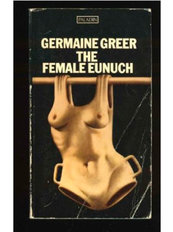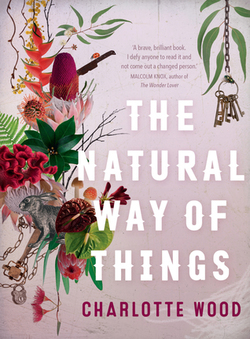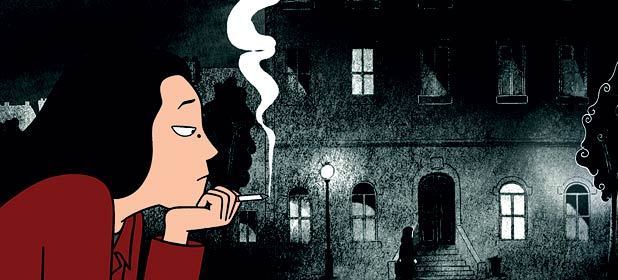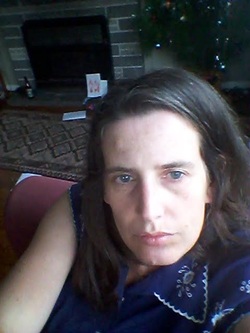Things I think about when I'm thinking about 'The Natural Way of Things' by Charlotte Wood #39/5/2016  Hair. I think about hair. An entire chapter of Germaine Greer's 1970 book The Female Eunuch was dedicated to hair. "The more clothes women are allowed to take off, the more hair they must take off", she wrote. Fifteen years later I took my mother's copy of that book off our bookshelf and read that chapter and understood something profound and life changing. For all Greer's faults she taught so many of us about the duplicity of liberation. Of the hair women are allowed to have, head hair, she wrote: "I’m sick of peering at the world through false eyelashes, so everything I see is mixed with a shadow of bought hairs; I’m sick of weighting my head with a dead mane, unable to move my neck freely, terrified of rain, of wind, of dancing too vigorously in case I sweat into my lacquered curls" Without remembering who or exactly what they said, I distinctly recall another prominent feminist lamenting how many sisters cut off their beautiful hair in the name of feminism. As if they were doing a disservice to themselves. The desire to ensure we are liberated from both the shackles of society and the shackles of formulaic rebellion I suppose led us to 'choice feminism'. (Ha, as if previous iterations of feminism were about anything else). But in the online feminist forums I've visited choice feminist arguments around hair, particularly body hair, are vacuous. I've read countless variations of the "Women should only shave if they want to, and I support that, I just like the feel/look/aesthetic/sensation of shaved [insert body part] and that's my choice". What's missing is any discussion of how difficult it is to pursue a choice that is not socially endorsed. Or any analysis about why the particular hairless forms of 'beauty', the ones prescribed to us, have so much more traction than the alternatives even among the "choice feminists'. Or analysis about the processes of normalisation, and how this stymies any genuine choice. It was not until I read Persepolis, the brilliant autobiographical comic novel of Marjane Satrapi, that I really got how the removal of body hair, the adoption of particular beauty customs, could be rebellion. I think I found the book (and the movie of it) particularly moving because Satrapi is my exact contemporary, born just a few months before me but growing up in Iran. We have occupied the same decades at the same moments of our lives. She surreptitiously bought street corner bootleg copies of the same albums stacked in my local record shop. There's a scene where an adult Marjane emerges from a period of intense depression and realises with horror that her legs are hairy. In a wonderful moment of energy and recovery she shaves her legs. For a liberal family struggling with the enforced requirement for women to cover up their bodies and a constant deflation of women's sexuality, leg-shaving and lipstick become a political reclamation of sexuality and self. In Iran, I could see the uncomplicated sense in that. The Natural Way of Things lifts discussion of the knotty issue of hair up a few notches. Body hair and head hair are tangled and woven through the book, through the women's identity, through the history of who they are and what has happened to them. Hair is crucial. Early on in the book, Yolanda (one of the two main characters) wakes after being abducted in an unknown building wearing strange clothes. On that first day she follows, on instruction, a man into a room where he holds a knife. She's flooded with relief when she understands she's getting a haircut rather than being killed. But the sense of threat lingers. It's still violation and loss and she's escorted into a room full of bald, frightened women. Later, as Yolanda tries to figure out what's going on she thinks about the house she and her brother Darren grew up in. Their mother, Gail, operated a waxing clinic in the lounge of their house and Yolanda describes the smell of the wax and her own assigned chores of melting and sieving the hair out of the wax so her mother could re-use it. Through Gail's clients Yolanda is educated early about the uncomfortable currency of her beauty. ...almost every time, the women would glance across the room and then whisper to Gail, That girl of yours, my god. Sometimes it was people in the street who stopped and said, What a beauty. Made jokes about touches of the tar brush and how exotic and when she's a teen and locks and keys and boys. Yolanda also thinks about the mice her brother kept as pets, who stank ('sourly nutty and musty') and who reproduced rampantly, her brother regularly disposing of the babies. We get the first inklings of the dissolving boundary (something the book goes on to explore further) between women and animals, hair and fur becoming a kind of portal. Yolanda feared that mother mouse and her cold, incessant production. It was something to do with her, she knew, not Darren. It had something to do with the hairlessness of the women on Gail's bench, the squirming babies, with all the creams and lotions, with their whispering to her mother, What a beauty, but meaning something adult and uneasy and expectant. We hear that in the first month in the prison, the women's pubes grow 'bristling back', one woman cries having never seen her own pubic hair before. While the murk of the surroundings descend on them, lice and infection and hunger, three of the women bond through adopting beauty rituals. They were never apart, one's arm always around another's waist or neck. Grooming each other lovingly, plaiting one another's filthy hair and tying it up with bits of rag, plucking each other's eyebrows so fine they almost disappeared. Sitting in the sunshine, inspecting their legs and pubes and underarms, descending on each enemy hair when one emerged. When Yolanda sees other women in the prison removing their body hair she says "Good for them...they will be first in line when Boncer and Teddy [the guards] finally decide they can have their pick". There's a compulsion shown by almost all the women in TNWOT to continue to adhere to the beauty standards of a society that has damaged them over and over. Even when the damage is seemingly caused by those same standards. Yolanda's beauty, Verla's 'tartiness'. "I didn't understand" says Evangeline, one of the characters in Mireille Juchau's novel The World Without Us (also shortlisted for this year's Stella Prize) "how you could be what the boys wanted, then hated for it after.' Later in the book there's a scene when the women discover a bag which contains their hair that was cut on their first day in the prison. On seeing their ponytails and plaits they weep. Some of their hair is used in a gruesome and powerful upcycling project, a project used to buy them a chance at one remaining freedom. It's weird, how the hair of the women is both an intimate part of them - a talisman for the lives they've lost, the ones they used to have - and nothing to do with them, now severed from them, their hair has a ghostly, unoccupied quality. Beauty made bizarre and smelling of synthetic shampoo. The contradictions of hair keep being interesting, and awful. There are, of course, the shaved heads of nuns, the shaved heads of Jewish prisoners in concentration camps, and the horrifying industrial use of it, there's head shaving as punishment, and as liberation and as protest. At my primary school, one of our classmates had a mother with very very long hair. She, or at least her husband, were we understood, part of some deep Christian cult and she was not allowed to cut her hair. After many years she separated from her husband and I remember first seeing her, at the dangerous pedestrian crossing of our little school, with a short bob and seeing how light and happy she looked. How free. Near the end of TNWOT, the women have their first contact with the outside world since their arrival many months previous. They are malnourished and sick, exhausted and traumatised. They're filthy and they are handed satchels filled with expensive face cream, chocolates, and razors. It's a brilliant, preposterous and telling scene. The women's sense of self worth, of humanness, of womanhood is inextricably bound up with the conventional trappings of beauty culture. Rather than being outraged by the luxury packs which give them nothing of what they so desperately need, they're delighted, flattered even. But these women aren't stupid. It seems to me they see all of it at once: the emptiness of the gesture; their willingness to accept it; the power of tools that allow you to recreate at least the surface layer of yourself (or to think you can); the awful violence of the gift they're given. ...they are all squealing because Lydia's holding up a silver razor and hitching up her dress, looking down at her soft-furred legs and sobbing with grief and relief. They all dive into their bags for the shining thing and come up with it, a beautiful bullet, a scalpel in their hands.
0 Comments
Things I think about when I'm thinking about 'The Natural Way of Things' by Charlotte Wood #25/5/2016 It's all so damn relevant. The women in The Natural Way of Things could be real. They could be plucked out of the last month's newspapers, or the month before that, or before that. There are always fresh crops of women available for public persecution. In the very few weeks since I've read The Natural Way of Things multiple women have come forward about the predatory behaviour of a man prominent in the NZ music scene, numerous people are defending him, friends of Facebook friends write it would be interesting to hear the other side of the story. There's been an Auckland court case about inappropriate sports massages involving teenage girls, hotly denied by the coach involved; Monica Lewinsky is being derided as ugly; and a woman has won a decades long battle to see the Catholic priest that abused her sent to jail. The church knew and hadn't told. Verla looks around the table then. Despite the shaven skulls, one by one the girls' faces clarify for an instant--and then merge, and Verla knows that she and they are in some dreadful way connected. The particular prison Wood writes of is fiction, but the experience of women in society, taught to validate themselves and each other based on their ability to attract men, the indecency with which men treat them, and the quick cruelty of society in assessing women's willing or unwilling sexual engagement with men is not invented. There's nothing new here, Wood just wrote it down. And in TNWOT, it's not just an anonymous public, or Facebook comments or men that hold the women in contempt. The women in the prison judge each other with little compassion. They're cruel and absorb uncritically the ideas that others hold of them. I wonder if this is what Charlotte Wood meant when she said she did not intend to write a good feminist novel. The women are implicated, brave and brilliant in other respects, but they go with it, fanning quite pure hatred of each other. This feels brutal and real and true. Hetty, the cardinal's girl cops the worst of it. What the cardinal had seen close up, Verla knows now, was Hetty’s wet red mouth, the coarse black eyebrows, potent with some ferocious carnality. He saw what Verla could see now, that Hetty was a little muscled dog that knew how to bite, and how to indiscriminately fuck. If she were a male the pink crayon of her dick would be always out. Things I think about when I'm thinking about 'The Natural Way of Things' by Charlotte Wood #12/5/2016  I keep trying to write about why I love (totally love) The Natural Way of Things by Charlotte Wood, winner of this year's Stella, a prize for an Australian book of fiction or non-fiction by a women. But I get overwhelmed. It's too big. This is a big rad impossible important book. Like a hippopotamus on a stool in the kitchen. I sometimes stop thinking about it and then I go back and look and it's still there. Being big. So I have to do this in stages. A bit at a time. with breaths and a day maybe days in between. Fragments and interrupted thoughts. I think this might be how reading is for me. Messy and convoluted. Potency revealing itself all at once and eking out gradually. Full of sense and nonsense. This one, I can't write tidily about. Okay. First things. When I first start reading the book I have read nothing about it, I haven’t even read the blurb on the cover. I'm dislocated. Lost. Bewildered. I have no idea where I am or what’s coming. The two women I read about, Verla and Yolanda, are lost too, waking drugged, confused and finding themselves in a type of asylum. Chapters alternate between them, each trying to locate themselves through sight and sound, and touch. Listening to birds. Watching the walls and then each other. Their physical experience amplified in their desperation to understand. Outside, a single white cockatoo shrieks, closer and louder until the sound of it fills the room with murder. She and the girl lock gazes again, and then Verla peers back outside, up at the slot of sky. The not knowing is a kind of madness, there’s a clear demarcation between where they are and where they’ve been before. Beyond that they’re grasping, full of doubt. Yolanda thinks Perhaps they were right. Perhaps she was mad and all would be well. I keep reading and a kind of madness takes me over. What the hell is this book? What is this place? Who wrote it? Who has conjured, who has thrown and centred, in some desolate isolated ex-sheep farm of Australia, a compound for women who have come out the wrong end of public sex scandals? Who has written of a compound where indescribably awful things happen to inconvenient women and then described those things? Who understands that society might just hate women that much?
Ten women are at the compound. Their hair is shaved, they are given rough Edwardian scratchy clothing to wear and slops to eat. They are chained together and marched for hours for the sole purpose of being shown a perimeter fence which has such intense electricity running through it you’d die if you try to escape. They are guarded by a homophobic thug and a dreadlocked hippy each as vile and misogynistic as the other. This set up totally shouldn’t work. It’s too much. Too trope-y. Too ridiculous. Yet it's not and it does work, in grave and devastating ways. Others (by this time I’ve started reading about the book) have mentioned Atwood’s The Handmaid’s Tale which I thought about while reading, but I also thought about Frame’s depiction of a seemingly ludicrous human culling law in her 1970 novel Intensive Care. Like Atwood and Frame it seems the fictional depiction of something so extreme and awful provides a shattering context for what’s really going on. I mean that, that there, you want to say, would never happen. Would it? Yeah, no. Yeah. Read part #2 |
Categories
All
Archives
March 2023
(C) Copyright 2012, Mrs Loolupants, All Rights Reserved.
|



 RSS Feed
RSS Feed
